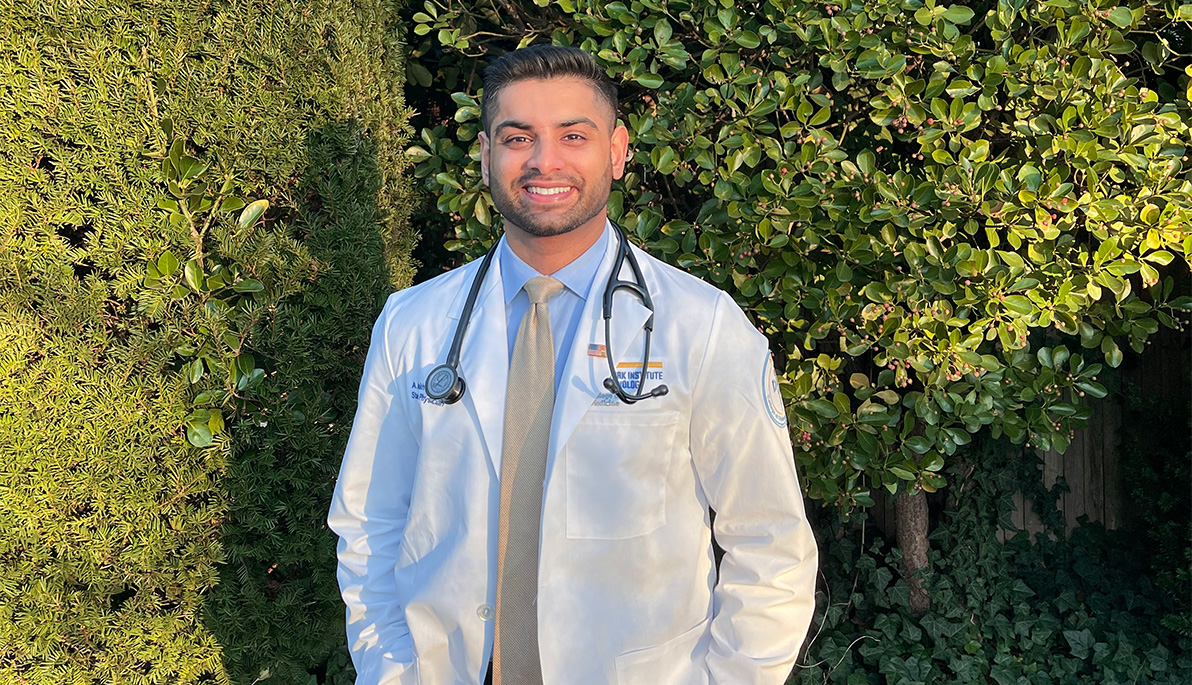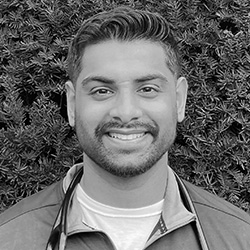
Student Profile: Asad Sheikh

Hometown: Staten Island, N.Y.
Major: D.O., Osteopathic Medicine, M.S., Medical/Healthcare Simulation
Year Expected to Graduate: 2024
Campus: Long Island
Family Practice
Asad Sheikh (B.S.’17) had such a positive experience as an undergraduate at New York Institute of Technology that when it came to applying to medical school, there was little question about his first choice. He volunteers with New York Tech’s Rock Steady Boxing program, which helps alleviate symptoms of Parkinson’s disease, and is trained to help with the Asylum Clinic at NYIT College of Osteopathic Medicine (NYITCOM). In addition to pursuing his D.O., he is also enrolled in the Medical/Healthcare Simulation, M.S. program. He spoke to The Box how his family inspired him to pursue a career in medicine and his plans for the future.
Tell us a bit about yourself. Why did you choose a career in medicine?
I am from Staten Island, New York, and my parents immigrated from Pakistan in the 1970s. My father is a microbiologist at Mount Sinai Hospital, and my mom used to work as an OB/GYN. I have two brothers; one is a physician and the other an electrical engineer. My family was my first exposure to the field of medicine, and their influence was a major reason I chose it as a career.
You took a slight detour along the way. Can you tell us about that?
I originally enrolled in the Life Sciences, B.S./Osteopathic Medicine, D.O. program, and had always planned to be a doctor. I briefly went to podiatry school after graduating from undergrad because I thought I wanted to be a foot and ankle specialist and surgeon. However, after some time in podiatry school, I wished to have a larger scope and work in different specialties, which ultimately led me to switch back to NYITCOM.
What made you choose NYITCOM?
An important factor in my decision to stay for medical school is the school’s comprehensive curriculum with community-based learning. A physician’s success is based a great deal on the curriculum and courses. Research and its use in evidence-based medicine was another important deciding factor. A great physician needs to be able to determine which information is not only applicable in the clinical setting but also further the knowledge in the medical world.
You were part of a research team studying Bell’s Palsy at Touro College of Osteopathic Medicine (TouroCOM). How did you become involved?
I wanted to learn more about osteopathic medicine through a physician and see how exactly it works in practice. Dr. Mikhail Volokitin M.D., D.O., graciously offered me a chance to attend the manipulation lab at TouroCOM and shadow him at his clinic in New York City. This quickly became one of my favorite experiences in osteopathic medicine. While he was treating a patient with Bell’s Palsy, I witnessed Dr. Volokitin use specific osteopathic manipulative techniques (OMT) to help alleviate their symptoms. We had been monitoring their progress in our notes and the patient had agreed to be a part of our study for a case report. We had documented and reported on how certain OMT’s can help with restoring normal structure-function relationships in patients affected by Bell’s Palsy.
Was there a specific moment that made you think New York Tech was the right place for you, either before attending or while enrolled?
From the time I applied, I knew NYITCOM would be the perfect school for me. The admissions department was always very helpful and caring when I would contact them about my application and the process. From then and until now, I have noticed the caring and family-like feel at NYITCOM. My professors and instructors have helped me learn, study, and take some of the pressure off of being in medical school. This, combined with the community and family environment with the upperclassmen, makes this a great medical school. NYITCOM’s events and adaptation to the pandemic made me realize that they prioritize me and my fellow students.
What is next for you?
I hope to be a physician, humanitarian, and educator. NYITCOM offers a diverse environment to thrive in academics, research, community involvement, as well as gain leadership skills. I am certain that my education and training here will continue to help me become the physician, educator, and humanitarian I plan on being.









